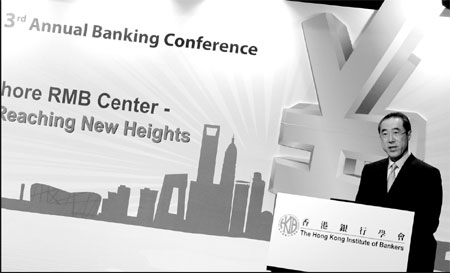Yuan products may face downside risk
Updated: 2011-09-28 06:52
By Oswald Chen(HK Edition)
|
|||||||||
|
Chief Secretary for Administration Henry Tang delivers a speech at the Hong Kong Institute of Bankers third annual banking conference on Tuesday. Edmond Tang / China Daily |
The price of offshore yuan-denominated financial products in the city may face downside risks if yuan appreciation expectations are weakened, bankers and economists said at a conference organized by the Hong Kong Institute of Bankers on Tuesday.
One of the keynote speakers, International Monetary Authority (IMF) Hong Kong Resident Representative Sean Craig, said that local financial institutions and regulatory authorities should take steps to develop the market infrastructure for credit risk assessment before the market demand for yuan-denominated investment products flags.
"The current burgeoning demand for yuan-denominated investment products is primarily driven by expectations of yuan appreciation," Craig said. "However, in a long-term perspective, the local offshore yuan market cannot be sustained by yuan appreciation expectations alone."
"If the yuan stops appreciating, it may drastically curtail the demand for such products. This may push down the prices of such products and increase volatility in the offshore yuan market in the city," Craig cautioned.
Other bankers also voiced their concerns that market participants should be vigilant as the price of yuan-denominated financial products may eventually fall one day.
"In many cases, local financial institution seem to have not considered the possibility of yuan currency depreciation in the process of designing yuan-denominated investment products," said T.C. Chan, senior adviser at the Bank of East Asia Limited. "Investors and other market participants should be aware that the yuan will not move in an upward direction alone."
Sebastian Paredes, chief executive officer of DBS (Hong Kong) Limited, warned that the local financial market may be greatly affected if capital flees from yuan-denominated financial assets.
"Local yuan deposits have occupied 10 percent of the total deposit base in the city. If there is capital outflow from the local yuan-denominated assets, the impact upon the local financial sector will be very great," Paredes said.
According to Hong Kong Monetary Authority figures, local yuan deposits in the city at the end of July totaled 572.2 billion yuan, up 3.4 percent from a month earlier. Local yuan deposits have ballooned by more than 250 billion yuan since Hong Kong and the mainland signed the supplementary and revised agreement on renminbi business in July 2010. Yuan deposits now account for 10 percent of total deposits in the city.
The yuan fell sharply against the US dollar in the Hong Kong offshore market on September 23, extending the slide from the previous day. The yuan currency, together with other Asian currencies, is coming under severe selling pressure as global investors are eager to liquidate their long yuan positions to lock-in their profits amid the growing volatility in the global investment market.
oswald@chinadailyhk.com
China Daily
(HK Edition 09/28/2011 page2)
